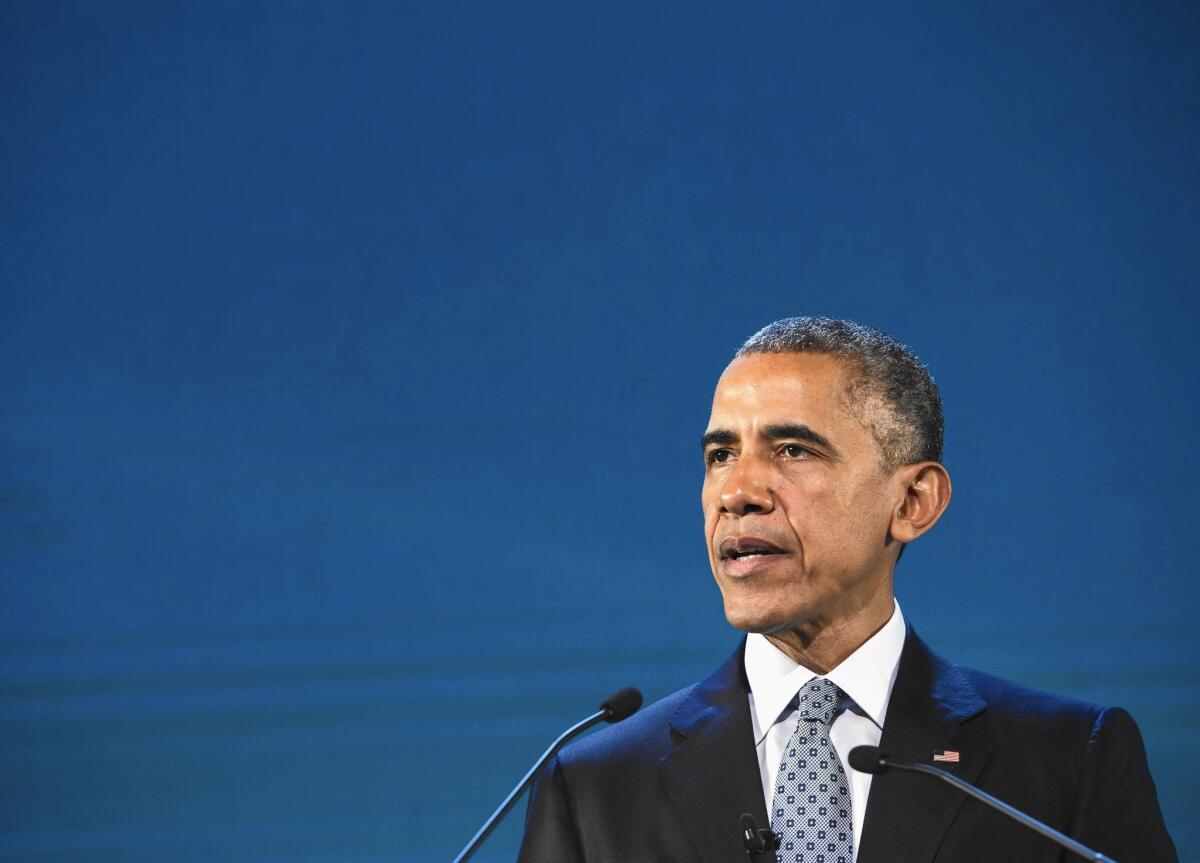France, Russia and U.S. will try to cooperate in fight against Islamic State

President Obama said this week he would support military cooperation with Moscow if it focuses on defeating Islamic State.
- Share via
Reporting from WASHINGTON — President Obama publicly vowed to “redouble” U.S. efforts against Islamic State hours after the terrorist massacres in Paris, but officials offered few details as to what he meant.
That could change when French President Francois Hollande visits the White House on Tuesday as part of a trip to create what Hollande called a “grand and single coalition” that links the United States, France and Russia against the militants.
Obama said this week he would support military cooperation with Moscow if it focuses on defeating Islamic State, and not on propping up Syrian President Bashar Assad. He said he personally gave that message to Russian President Vladimir Putin when they met on the sidelines of the Group of 20 summit in Turkey.
For his part, Putin sent Russian bombers and cruise missiles to pound Raqqa, the militants’ self-declared capital in Syria, after authorities in Moscow confirmed that a bomb had destroyed a Russian passenger jet over Egypt last month, killing 224 people.
Whether the confluence of interests and events will help Obama and Putin forge a tactical alliance, despite their deep divide over Ukraine and other issues, is unknown.
The French seem to be groping for a course that would increase pressure on Islamic State, while stopping short of the major military escalation that Obama has firmly ruled out.
French officials signaled that they won’t ask Obama to deploy large numbers of ground troops to Syria or Iraq. Another invasion by Western ground forces would be Islamic State’s “dream,” Gerard Araud, the French ambassador to the U.S., said this week.
A U.S.-led coalition has launched more than 8,000 airstrikes on Islamic State targets since mid-2014. But three out of four pilots now return without dropping any bombs because they can’t find appropriate targets, or fear hitting civilians, according to the Pentagon.
French officials are clear they want to pick up the pace of attacks to break the stalemate and push the militants out of their strongholds. At a minimum, analysts say, they want to broaden the list of targets coalition aircraft can attack.
Allied warplanes have tried to avoid killing civilians, and generally have avoided major economic infrastructure such as large oil refineries, fuel tankers and water-supply facilities because their destruction could hurt civilians.
Shortly after the Nov. 13 attacks in Paris, allied warplanes destroyed 116 oil trucks allegedly used by the militants in eastern Syria, a move that U.S. officials said marked a shift in tactics.
Pentagon officials now are reviewing whether to get more aggressive in targeting, Defense Secretary Ashton Carter said Thursday on MSNBC.
“We’re prepared to change rules of engagement,” he said. “We’ve changed tactics, as we just did in the case of the fuel trucks.”
Human rights officials were quick to warn that any easing of Pentagon rules could cause civilian casualties and potentially violate international law.
“We have seen far too many times that militaries are quick to respond to attacks without taking in account possible effects on innocent civilians,” said Andrea Prasow, deputy director at Human Rights Watch in Washington. “I’m not saying that’s what’s going to happen here, but it has happened in the past.”
Analysts said Hollande may also suggest increasing U.S. and French special forces in Syria. Obama recently authorized sending about 50 special operations troops to work as advisors with Kurdish militias and other rebel groups in northern Syria. It’s not known if France has any troops there.
The French have sent their largest aircraft carrier, the Charles De Gaulle, from southern France to the eastern Mediterranean. Including the carrier force, the flagship of the French navy, France will have a total of 40 warplanes in the conflict, according to the defense ministry.
Michael Shurkin, of Rand Corp. in Washington, said that by increasing the pace of airstrikes, adding more special forces, and coordinating more closely with Russia, the proposed alliance could make a difference.
“They could do something substantive and meaningful,” he said. But he added, “it’s still not something that’s going to bring victory overnight.”
France also is seeking logistical and other support from other European countries. After the Paris attacks, Hollande’s government invoked a section of the European Union charter that requires all members to come to the aid of partner nations that are under threat.
The French “don’t feel like their European partners have really made much of a contribution so far,” said Jeff Lightfoot, of the nonpartisan Atlantic Council, a Washington think tank.
U.S. officials say they don’t expect major announcements after Obama and Hollande meet next week. Most of the military steps they are considering would be classified.
Hollande’s overtures have been received warmly by Putin’s government, which is eager to be seen as a partner of Western Europe, especially against the extremist threat it has warned its public about.
The French approach is “exactly what [Putin’s] been dreaming about,” said Alexander Gabuev, a Moscow-based foreign policy expert for the Carnegie Endowment of International Peace.
More to Read
Sign up for Essential California
The most important California stories and recommendations in your inbox every morning.
You may occasionally receive promotional content from the Los Angeles Times.











